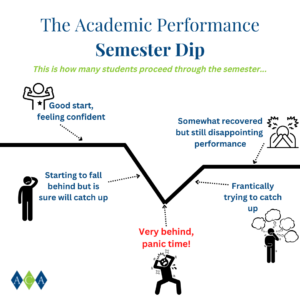
The College Freshman Dip
Posted on October, 31, 2022 by Susan Schaefer, M.Ed., M.A.T, Founder & CEOby Susan V. Schaefer, Owner, Academic Coaching Associates
The College Freshman Dip may sound like a delicious snack that goes well with tortilla chips, but in reality, it’s a phenomenon that a percentage of new college freshmen, and more seasoned college students, experience. The Semester Dip is a repeating pattern that generally begins the fall semester of freshmen year, or even earlier in your student’s academic career:
1) The student starts the semester off strong,
2) About 4-6 weeks in grades begin to dip,
3) A crucial low point is reached, the student panics and frantically tries to recover grades,
4) Grades generally increase, but the semester does not end as strongly as it began.
5) The student vehemently promises this will not happen again.

Students with weak executive functions, ADHD, and mental health issues are especially vulnerable to The Dip. They can hold it together at the beginning of the semester because there is a lighter workload. But the work gets more intense, more studying is required and assignments begin to slip through the cracks. Students get overwhelmed and shut down because they do not have the tools to sustain the same level of progress over the course of the entire semester.
Obviously, the key is to prevent the decline in grades before it happens but this is easier said than done. However, there are measures parents can take to reduce the risk of The Dip.
– Make sure the FERPA form is signed so you have access to their portal to view grades and assignments so you are aware of progress in real-time.
– Intervention is needed to break maladaptive habits and teach your student proper sustainable strategies for academic success. This is where an Academic Coach comes in.
– Create a student contract with your student before the semester begins or when they are home for a break outlining clear expectations you both agree on.
– If your student drastically reduces communication with you, they may be avoiding telling you all is not well in school. Initiate a supportive conversation and ask direct questions.
As soon as you know your student is struggling, it’s time for an open discussion either in person or via a video platform such as Zoom. Your tone and body language are so important when discussing The Dip. Your student most likely feels disappointed and shameful in their performance and may question if college is even for them. Although you understandably may feel stressed yourself, take a deep breath and reassure your student that everyone has setbacks, there are ways to get help and although things look bleak now, they will get better.
If you need support in creating a student contract or to learn how to most effectively communicate with your child, sign up for a parent coaching session.
If you would like to discuss this issue with a professional academic coach, make an appointment for a free phone call by clicking here.
